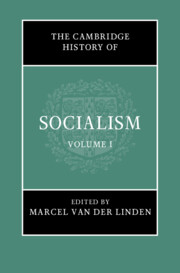Book contents
- The Cambridge History of Socialism
- The Cambridge History of Socialism
- The Cambridge History of Socialism
- Copyright page
- Contents
- Figures
- Maps
- Tables
- Contributors to Volume I
- Abbreviations
- Introduction to Volume I
- Part I Beginnings
- Egalitarianism
- Early Socialisms
- The Arrival of the Hostile Siblings: Marxism and Anarchism
- 10 The International Working Men’s Association (1864–1876/7)
- 11 Karl Marx, Friedrich Engels, and Early Workers’ Movements
- 12 Pierre-Joseph Proudhon’s Mutualist Social Science
- 13 Mikhail Bakunin and Social Anarchism
- 14 Peter Kropotkin and Communist Anarchism
- Part II Negating State Power
- Index
- References
10 - The International Working Men’s Association (1864–1876/7)
from The Arrival of the Hostile Siblings: Marxism and Anarchism
Published online by Cambridge University Press: 03 November 2022
- The Cambridge History of Socialism
- The Cambridge History of Socialism
- The Cambridge History of Socialism
- Copyright page
- Contents
- Figures
- Maps
- Tables
- Contributors to Volume I
- Abbreviations
- Introduction to Volume I
- Part I Beginnings
- Egalitarianism
- Early Socialisms
- The Arrival of the Hostile Siblings: Marxism and Anarchism
- 10 The International Working Men’s Association (1864–1876/7)
- 11 Karl Marx, Friedrich Engels, and Early Workers’ Movements
- 12 Pierre-Joseph Proudhon’s Mutualist Social Science
- 13 Mikhail Bakunin and Social Anarchism
- 14 Peter Kropotkin and Communist Anarchism
- Part II Negating State Power
- Index
- References
Summary
The International Working Men’s Association (IWMA) was the first truly international working-class organization. It was founded before the development of mass working-class parties, and it mostly gathered trade unions which numbered a few hundred or few thousand members, associations, co-operatives, and individual members. It favoured various forms of solidarity among workers: co-ordination between unions to prevent the international circulation of strike-breakers, financial support for strikes, support for political refugees. It debated and passed resolutions on many issues: some stemmed from social and economic preoccupations – from production co-operatives to land ownership and socialism, from the machine question to children’s and women’s labour, from the eight-hour day to universal compulsory education.
- Type
- Chapter
- Information
- The Cambridge History of Socialism , pp. 232 - 260Publisher: Cambridge University PressPrint publication year: 2022

